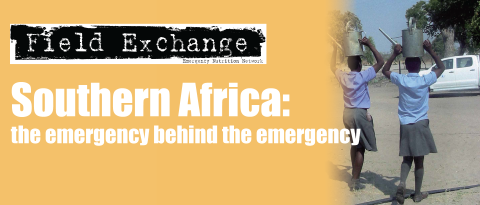Chronic vulnerability in Niger
Summary of published research1
Niger has suffered from chronic malnutrition, rooted in structural vulnerabilities, for several decades. According to a recent article in Humanitarian Exchange, the basic causes of malnutrition in Niger relate to lack of availability of human, structural and financial resources, inadequate formal and informal infrastructure, and national and regional government policies. The underlying causes acting at household and community level encompass care practices, social and cultural expectations, health services and environment and food access and availability. The authors state that UNICEF has come to learn important lessons about nutritional problems in Niger. These are set out below.
Early warning needs to be strengthened, particularly with regard to nutritional information. This won't be easy due to a lack of in-country capacity to collect, analyse and interpret data and inability to raise nutrition as a key priority with government, donors and partner agencies. However, from 2006 UNICEF plans to undertake twice-yearly national nutritional surveys.
There is also a need for a broader framework for understanding malnutrition. Past analysis has focused on production and availability of grain staples at the expense of other indicators such as changes in import and export regulations governing grain, market prices and access to food and malnutrition. Other factors like lack of access to health services, cultural practices and gender inequality were inadequately incorporated into national vulnerability analysis and subsequent programming.
A broader regional analysis of the problem of malnutrition is critical. UNICEF has developed an interagency proposal for West and Central Africa that focuses on addressing both acute and chronic malnutrition and involves;
- strengthening early warning systems, including nutritional surveillance systems
- developing a regional approach to the treatment of severe and moderate malnutrition using a decentralised community-based approach
- establishing adequate supplies and stockpiles of emergency commodities,
- addressing infant and young child feeding, and
- strengthening national nutrition policies to reflect emergency nutrition and other child survival activities.
Separating humanitarian and developmental efforts potentially sets up a false dichotomy between normality and crisis, obscuring the fact that many people live perpetually close to the edge of crisis. UNICEF and partners should recognise that earlier interventions, such as strengthening people's livelihoods, developing national capacity for emergency response and advocating for improved access to social services and markets are critical interventions in countries where chronic vulnerability exists.
In August 2005, a strategy to address the problem of acute malnutrition in the context of chronic vulnerability was implemented. With regional and HQ support, the Niger country office assumed a greater technical, leadership and coordination function in nutrition through its support to the Ministry of Public Health, and in cooperation with NGOs. UNICEF now has technical nutrition staff based in Niger as well as in the regional office to support strategic changes at the policy and programme levels.
Existing UN coordination mechanisms in Niger, such as the UN country team, were slow to acknowledge the severity of the crisis in 2005. Close collaboration and coordination between the different UN and other agencies in Niger is critical, especially in the area of nutrition. An adequate collaborative UN response in a nutritional crisis needs well defined agency responsibilities (UNICEF for surveillance, treatment of malnutrition, infant feeding and Vitamin A; WFP for food aid; FAO for food security; WHO for health). UNICEF, as the lead UN agency for nutrition, needs to ensure that policies and programme priorities are based on a framework that engages and holds accountable each of these agencies for effectively addressing and preventing malnutrition in emergencies.
UNICEF needs to establish a long-term approach to strengthening emergency nutrition capacity within the Niger government. This will require more than intermittent training workshops, and will need to be sustained over a long period. UNICEF should support and be accountable to, specific capacity development results and outcomes within Niger's government and other national structures.
During the recent emergency, relatively greater emphasis was placed on short-term advocacy, rather than strategic policy advancement. UNICEF and its partners must work to ensure that rigorous, evidence based assessments are used to inform and develop a countrybased advocacy strategy for immediate and long-term change. Evidence based advocacy in Niger is also required to raise the profile of nutrition in general; achieve greater cohesion between interventions addressing chronic and acute crises; win broader recognition of the various causes of malnutrition (not just food related); revise and change health policies that support more equitable health services; ensure that social, cultural and gender-related causes are consistently addressed; and make certain that changes in cross-border trade regulations have minimum negative effects on people's access to food.
The humanitarian community has achieved significant progress in recent months to address the crisis in Niger, but chronic vulnerability and high levels of chronic and acute malnutrition persist. Greater efforts are required to understand and respond to this chronic vulnerability.
1Borrel. A, Rumber. L and Mathurin. G (2006). Chronic vulnerability in Niger: implications and lessons learned for UNICEF's emergency nutrition response. Humanitarian Exchange, No 34, pp 25-28, June 2006
Imported from FEX website


